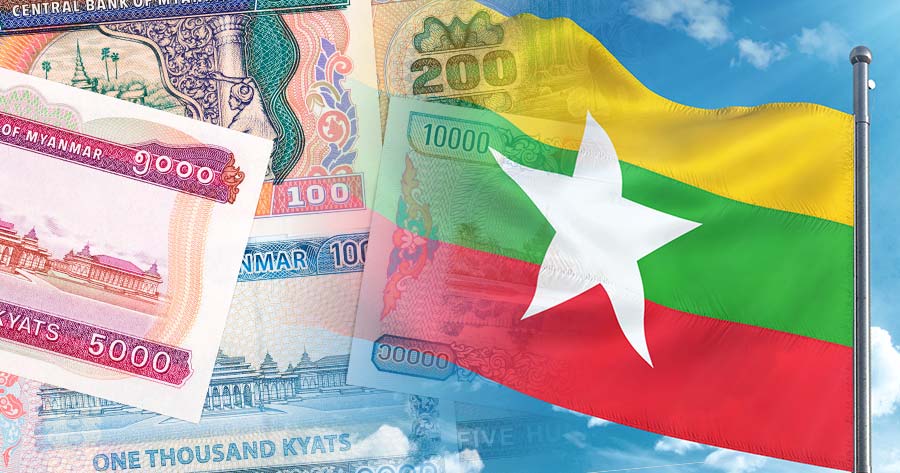Past few days have seen a harsh sell-off of several stocks on reports that the central bank of Myanmar has ordered local businesses and banks to suspend and reschedule repayment of foreign loans in order to stop a decline in foreign exchange reserves.
Companies with Myanmar-related operations, such as OSP, CBG, and MEGA, saw a panic sell upon reports of Myanmar’s suspension of foreign debt repayment. Analysts believe Myanmar junta’s latest move will have limited impact on Thailand’s international trade, but it will affect Thai firms.
Asia Plus Securities said that by the end of 2021, trade between Thailand and Myanmar amounted to US$4.82 billion. After China, with whom it trades US$12 billion (36% of its total trade), Thailand is Myanmar’s second largest trading partner, accounting for 14% of its foreign trade. Meanwhile, Myanmar is Thailand’s 35th largest trading partner, accounting for only 0.85% of Thailand’s worldwide commerce.
Given that Myanmar is Thailand’s No.35 trading partner, accounting for only 0.85% of Thai trade, ASPS believes Myanmar’s suspension of foreign debt payments should have limited impact on Thailand. Listed companies with operations in Myanmar will also see a small impact as well. Thus, this issue will have more negative sentiment than fundamental impact, but still affect Thai firms as follows:
Construction material – Thai building material producers (cement, ceramic tile, etc.) normally make less than 5% of sales from export to Myanmar. SCC‘s cement plant with 1.8 million tons/year capacity halted operation in 2020 after a dispute with a local partner and SCC already set provision for asset impairment loss at THB4,335 million. Before SCC halted its cement business in Myanmar, cement sales in Myanmar made up 0.7% of its total revenue in 2020. SCC’s revenue from Myanmar is currently very small.
Contractor – Four contractors have businesses related to Myanmar:
ITD spent THB7,843.6 million in Dawei before Myanmar canceled the concession on Dec. 30, 2020. ITD didn’t account for such impairment loss because it believed it could negotiate with the Myanmar government.
NWR owes THB191 million from hotel building in Myanmar, which will be paid off from December 2022 to December 2036. THB5 million of such debt is set to be paid in 2022.
TTCL owns 40% of Ahlone#1 (120 MW) and shares a profit of THB100 million/year. TTCL signed a power project PPA with Myanmar in 2021, although it has no loan source yet.
SEAFCO owns 80% of its subsidiary SEAFCO (Myanmar). It has no project in Myanmar but three foundation piling machines, four crane trucks, and a backhoe to sell or ship back to Thailand.
Beverage – OSP (Target Price: THB37) posted 2021 total sales of THB27 billion, THB4.3 billion (17% YoY growth) or 16% from overseas sales, namely Myanmar (10% of total sales). OSP mainly sells via subsidiaries in Myanmar (OSP holds 85% stake in total) in MMK. These measures will hardly affect OSP’s sales. Yet, purchasing power and money collection in Myanmar and MMK rate have to be watched.
OSP borrows in USD via two associates in Myanmar (OSP holds 35% stake in a glass bottle producer and 51.8% stake in a glass bottle seller). According to them, OSP has US$30 billion loans from Thai banks (one-time repayment in the next seven years). OSP has debt burden (based on shareholding) not higher than EBITDA of THB5 billion/year and net cash of THB3 billion at end-1Q22; it is managing interest expense by negotiating with the bank.
Banking-finance – Myanmar makes up about 1% of Thailand’s export, so this should have limited impact on finance plays. AEONTS (Target Price: THB250) stopped providing loans in Myanmar after the coup started in February 2021 and hardly has loans in Myanmar now, so it will be hardly affected by this.
Energy – PTTEP (Target Price: THB175) has many projects in Myanmar (Zawtika, Yadana,
Yetagun) but has no foreign loan for projects in Myanmar, so it is not affected by loan repayment suspension. For revenue from projects in Myanmar, PTTEP directly receives money from PTT in USD via its Thai account, so its revenue is not converted to MMK. Payment in Myanmar is converted from USD to MMK. Projects in Myanmar make payment in foreign currencies via accounts outside Myanmar, so they can manage expenses as normal.





